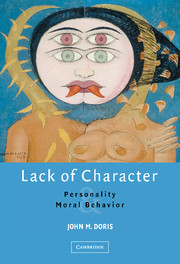Preface: A Renaissance of Virtue
Published online by Cambridge University Press: 05 July 2014
Summary
What is character but the determination of incident? What is incident but the illustration of character?
Henry JamesThe 1990s were a good time for virtue. Not because people behaved especially well; like other decades, the decade saw its share of moral lapses, from the horrific to the pathetic. The difference was that folks were talking about virtue more often, and more earnestly, than they had in generations. Rather churchy tomes on character began to shoulder aside sex and scandal on the best-seller lists, and virtue, as one columnist put it, was in fashion.
By then, virtue — at least talk of virtue — had been fashionable in academic philosophy for some time; philosophers in English-speaking university departments have been calling for increased attention to such notions since the 1950s. Of course, this agenda was something less than radical even then; neoteric discussion of virtue and character has antiquarian roots, most especially in Aristotle's monumental Ethics. The new wisdom, apparently, is much the same as the old wisdom.
I regard this renaissance of virtue with concern. Like many others, I find the lore of virtue deeply compelling, yet I cannot help noticing that much of this lore rests on psychological theory that is some 2,500 years old. A theory is not bad simply because it is old, but in this case developments of more recent vintage suggest that the old ideas are in trouble.
- Type
- Chapter
- Information
- Lack of CharacterPersonality and Moral Behavior, pp. ix - xPublisher: Cambridge University PressPrint publication year: 2002



